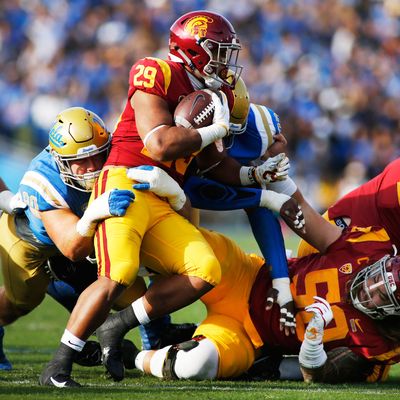
The loud and proud protests spearheaded by a triumphant U.S. Women’s World Cup championship team have placed the long-simmering topic of fair compensation for athletes back in the news. Obviously, they are focused on gender equity in professional athletics. But the same thematics of a helots’ revolt against exploitation by the men running the show have characterized a rising tide of furious opposition to the cynical “amateurism” rules of college sports that generate massive revenues for colleges, television networks, and coaches — for pretty much everyone other that the athletes whose labor this economy rests upon. And the latest threat to the collegiate status quo is a bill working its way through the California legislature that would give college athletes the right to be paid for the use of their “name, image and likeness.”
The proposed “Fair Pay to Play” legislation builds on successful class-action litigation against the National Collegiate Athletic Association for exclusively negotiating and recouping money from video-game producers that used former players’ images. To make a long story short, the court settlement forced the NCAA to allow full payment to student athletes of the true cost of their educations. But the California bill goes back to the root of the problem, as Sports Illustrated explains:
[T]he act would ensure that marketable college athletes could sign endorsement deals and licensing agreements — including for inclusion in video games, advertising campaigns and trading cards — without the risk of their schools punishing them, and with the counsel and advice of seasoned agents.
Perhaps I’m biased because my own alma mater, the University of Georgia, lost two all-American football players (A. J. Green and Todd Gurley) for parts of two separate seasons for, respectively, selling jerseys and autographs. But there’s nothing that quite so graphically illustrates the echo of chattel slavery in college sports as prohibiting athletes from owning their own “name, image and likeness.” Instead of justifying this patent injustice, the NCAA has resorted to a slippery-slope argument in opposing the California bill, claiming that the abandonment of any restriction on “amateurism” will eventually lead to full-scale market competition for players on wages. And these imperious barons of college sports aren’t asking California nicely to be careful about this breach in its rules, but are threatening to deny any school in the state access to NCAA-sanctioned tournaments and championships. The legislation, mind you, has a four-year phase-in period to enable negotiation with the NCAA and its president, Mark Emmert, as football blogger Michael Brochstein sardonically observed:
In other words, “Mark, get your organization’s collective head out of its ass and figure out something that’s more fair than the current ban.” This being the NCAA we’re talking about, though, it’s probably a 50/50 proposition that it sues to void the law first.
As it happens, the bill has already cleared the state senate (by a vote of 31-5) and one committee in the state assembly; it’s on a pretty fast track to enactment. It’s worth noting that there is counterpart federal legislation (sponsored by Republican Mark Walker of North Carolina and Democrat Cedric Richmond of Louisiana) accomplishing the same purpose.
If you look at the big picture of how college-sports economics work, the outrageous nature of the “amateurism” model becomes clear, as my colleague Will Leitch recently argued in comparing pay-to-play “scandals” with the real deal:
The dirty not-so-secret of most pay-for-play “scandals” in college athletics is that the crimes are usually more honorable than the law itself. While college sports are a multibillion-dollar business that expands exponentially every year — remember that when the [NCAA basketball tournament] brackets are announced Sunday, brought to you by the NCAA’s “corporate champions” at Chevrolet and Dr. Pepper — players themselves remain unpaid: The Final Four MVP a few years ago spent the week before the game complaining that he literally didn’t have enough food to eat. When any money is funneled to players, whether it’s through fan boosters, agents, or shoe companies, it’s technically against the rules; the irony is that this black market remains infinitely more just than the official rules in place.
The money changing hands in the Varsity Blues college-admissions scandal make the NCAA’s last-ditch defense of amateurism even more absurd, says Leitch:
Georgia Tech and its men’s basketball coach, Josh Pastner, received a Notice of Allegations from the NCAA, which almost always ends up being a death knell for the coach, about two Level I violations involving the program. What’s the scandal? A Georgia Tech assistant coach took a basketball recruit to a strip club and gave him … $300. Three-hundred dollars! You’ve got the Full House mom dishing out a cool half-million to get her YouTube kid on the crew team at USC — USC! — and the assistant coach at Georgia Tech, a school that brought in $88.3 million in revenues last year, is handing a kid 300 bucks in a back alley like it’s the most nefarious (yet generous!) thing a person could do.
The whole system is rotten, and the California legislation would just put a limit on the hypocrisy. The USWNT has gotten the nation’s attention with a demand that we honor athletes tangibly and equitably rather than making them labor gainlessly for others’ entertainment and profit. It’s time to overcome the phony sentimentality of our colleges’ “amateur athletics” and do the right thing.






























